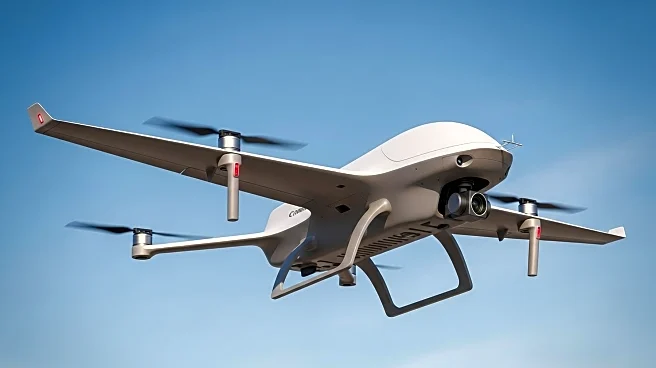What's Happening?
Turgis Gaillard, a French aerospace company, has successfully conducted the first flight of its medium-altitude, long-endurance (MALE) turboprop uncrewed aircraft system (UAS), named Aarok. The flight took place at Blois-Le Breuil airfield in Central France on September 9. The Aarok, weighing 5.5 metric tons, demonstrated significant maturity during its flight, according to company officials. This development marks a crucial milestone in the aircraft's four-year development journey. The Aarok is positioned as a potential replacement for the U.S.-supplied General Atomics MQ-9 Reapers currently used by the French Air Force. Turgis Gaillard has received financial backing from France's defense materiel agency, the DGA, and aims to make the Aarok available to the French armed forces promptly. Thales is collaborating with Turgis Gaillard to equip the Aarok with advanced sensors, including the AirMaster S search radar.
Why It's Important?
The successful flight of the Aarok UAS is significant for the European defense industry, as it represents a move towards greater sovereignty in military technology. By developing a homegrown MALE UAS, France could reduce its reliance on U.S. military equipment, potentially leading to more strategic autonomy. This development could also stimulate the European aerospace sector, encouraging innovation and competition. The Aarok's introduction may impact U.S. defense contractors, as European nations might opt for local alternatives, affecting sales and strategic partnerships. Additionally, the collaboration with Thales highlights the importance of integrating advanced technology into defense systems, which could enhance operational capabilities for the French military.
What's Next?
Turgis Gaillard plans to expedite the Aarok's availability to the French armed forces, potentially influencing procurement decisions within the French military. The company may seek further collaborations to enhance the UAS's capabilities, possibly expanding its market reach beyond France. As the Aarok undergoes further testing and development, it could attract interest from other European nations seeking similar capabilities. The success of the Aarok might prompt other European companies to invest in developing indigenous defense technologies, fostering a competitive environment in the aerospace sector.










